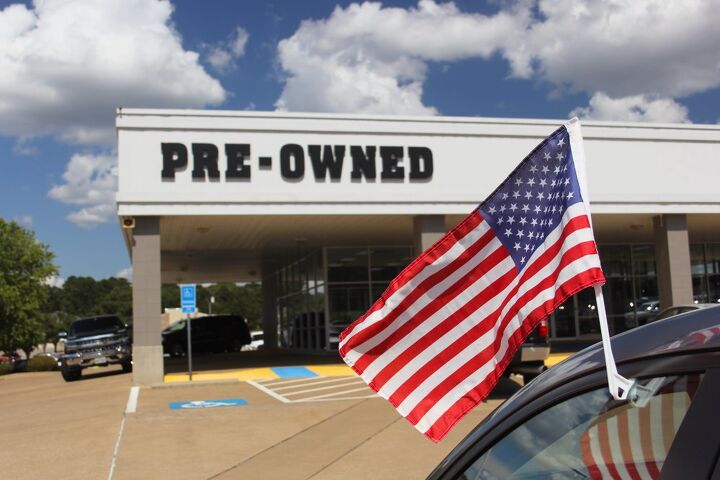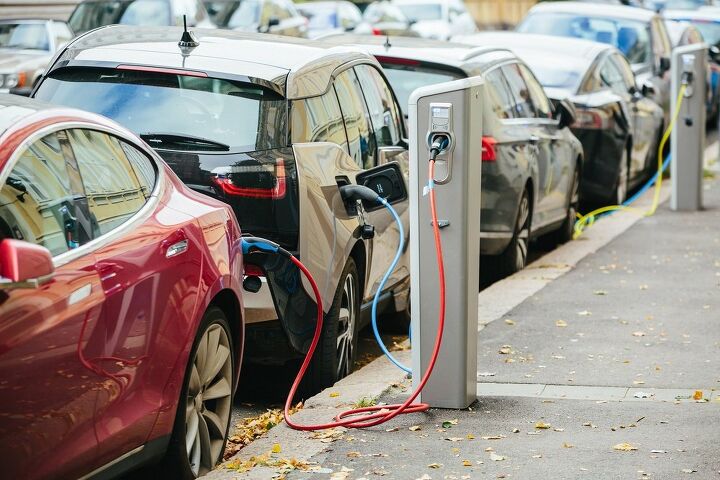#Surveys
J.D. Power Claims Vehicles Are Becoming Less Reliable
J.D. Power has released its U.S. Initial Quality Study for 2022 and the prognosis could be better. Automobiles are reportedly becoming less reliable and more expensive. While there are certainly valid reasons for this — ongoing supply chain problems, companies transitioning to novel electric powertrains, and remote working environments making it hard to collaborate on engineering — the bottom line is that the whole industry is blowing it.
Study Claims Gen Z Doesn't Like Buying Cars
Younger drivers have reportedly had it with the dealership experience, with Gen Z even more disenfranchised than Millennials. Though it’s difficult to imagine anybody visiting a showroom within the last 12 months having any other reaction. Incentives are down, prices are up, and there’s a good chance whatever you wanted to buy isn’t going to be on the lot anyway. Someone saying they had an exemplary dealer experience is becoming about as common as people claiming they enjoy going to the DMV.
However, CDK Global Inc. still opted to conduct a survey in the hopes of determining just how much less tolerant younger shoppers might be compared to older generations. The takeaway probably isn’t going to shock you, even if the sheer volume of first-time buyers that don’t care for dealerships might.
Study Claims EV Charging Reliability Is a Problem
Researchers with the University of California, Berkeley, are pouring cold water of the premise that electric vehicle charging stations will require less maintenance than traditional fueling solutions. The study, which examined 657 individual connectors between 181 public fast-charging stations in the San Francisco Bay area found that about 23 percent were nonfunctional.
That seems quite a bit higher than the number of fuel pumps that might be down at any given station, though the pertinent question is why those EV charging points were inoperable.
Survey Suggests Americans Still Doubt EVs [UPDATED]
While plug-in vehicles are catching on in Europe, representing 21 percent of all new registrations in the first quarter of 2022, they’ve been less popular in the United States. Only about 5.2 percent of American registrations were of the plug-in variety (representing hybrid and purely electric vehicles) during the same timeframe. Despite the industry spending billions to develop and market these vehicles, with some progress being made, the overall take rate within North America remains underwhelming.
Ardent fans of battery based powertrains will undoubtedly disagree. But a couple of studies came out this month that drove the point home. Autolist’s Annual Electric Survey dropped earlier this month, effectively outlining why EVs haven’t been able to make more headway in the states.
IIHS Study Suggests Buyers of Used Vehicles Learn Less About Their Car
The Insurance Institute for Highway Safety (IIHS) is claiming that individuals shopping for a secondhand automobile end up learning less about the modern features lurking within their automobiles. Considering salespeople have meetings about how best to hype the advanced driving aids in new models, this one really shouldn’t have required a survey for the IIHS to piece it together. But the outlet appears to be attempting to link this alleged lack of knowledge to make claims that it’ll somehow contribute to the probably of used vehicles being involved in a crash.
“Used car buyers were substantially less likely than new car buyers to know about the advanced driver assistance features present on their vehicles,” stated IIHS Senior Research Scientist Ian Reagan, the author of the study. “They were also less likely to be able to describe how those features work, and they had less trust in them. That could translate into less frequent use, causing crash reductions from these systems to wane.”
Where Are People Waiting the Longest to Buy a New Car?
Nobody should envy car shoppers right now. With production shortages ongoing, there’s never anything you want on the lot, and what is there is likely to be grotesquely overpriced.
This has encouraged consumers to wait longer before replacing their current ride, which is statistically likely to be far older than years past. But not everyone has the same level of patience or financial wellbeing, meaning certain parts of the country are seeing longer intervals between cars than others. There are also regional inventory disparities to account for, encouraging analytics firm Growth from Knowledge (GfK) to conduct an investigation into which parts of the United States are waiting for the longest to procure a new automobile.
Survey: Which EVs Are Leaving Drivers the Most Satisfied?
With electric vehicles getting a lot of press, you might be wondering which models are scratching consumers in all the right places.
According to J.D. Power’s U.S. Electric Vehicle Experience Ownership Study, the Kia Niro EV is the best thing the mainstream BEV market currently has to offer. The Korean model garnered a satisfaction rating of 744 points out of a possible 1,000. However, it wasn’t the top dog overall. That honor fell to the Tesla Model 3, which achieved a score of 777 points — besting the industry average for premium electrics by a whole seven points.
Um, What? Survey Claims People Happier With Modern Car Buying Experience
A new survey from Cox Automotive is suggesting that people are relatively pleased with their trips to the dealership these days — at least compared to the last few years. According to the team that’s been crunching the numbers over at Automotive News, “Buyer satisfaction with the shopping experience from the research stage through delivery dipped to 66 percent in 2021.” Back in 2020, respondents claimed they were happy 72 percent of the time. But in 2019 Cox was only getting 60 percent of shoppers to say they had an okay time buying a vehicle.
The uptick in 2020 is obvious. Showrooms were devoid of customers, production shortfalls hadn’t yet become the norm, and dealers were selling just about everything at a discount — keeping prices low until 2021 sent them into the stratosphere. However, the outlet still framed it as a win against 2019, suggesting that consumers are more satisfied with their shopping experience than before the pandemic. It also claimed that people who purchased vehicles online, the no-haggle alternative to going to a dealership to argue in a small room, tended to be happier overall.
Study Shows Auto Dealer Sentiment Still Ridiculously Positive
Car dealers have been polled for the fourth-quarter Cox Automotive Dealer Sentiment Index (CADSI) and they’re still incredibly optimistic, despite losing some of their earlier confidence that new-vehicle sales would be relatively healthy.
The dealer optimism – especially among franchised entities – seems to be wholly tied to profitability here. New vehicle sales dropped in 2019 and absolutely cratered in 2020 due to the nation’s response to the pandemic. In spite of there being plenty of talking heads in the news media telling you not to stress about the economy, inflation has created pricing increases across the board and automobiles are at the tippy top of that list. With inventories remaining relatively lean due to production slowdowns, staggering dealer markups have become the norm. Basically, stores just seem happy that they can charge more per car while they’re in short supply. But they’re also starting to have concerns about the long-term viability of the market and are are feeling the pinch of rising operating costs.
Tales From the Service Desk: Survey Says
If you’ve ever had your car serviced at a dealership, you’ve probably received a survey about the experience, either via snail mail or phone. Or perhaps online. This is especially likely if the work was done under warranty.
You’ve probably thrown out/ignored this survey. What you probably don’t know is that doing so may have cost your service advisor money and/or got him in hot water with the boss.
I certainly learned that one the hard way during my time as a service writer.
Report: People Willing to Pay Stupid Prices for New Cars
While we’d like to get away from stories about everything becoming more expensive, everything actually is becoming more expensive and it looks like a healthy slice of the population is allegedly willing to go along with it. According to the latest data coming from Cox Automotive, roughly 40 percent of the U.S. population would purchase a vehicle at 12 percent above sticker. There’s always been a subset of shoppers who don’t know when they’re being taken but this represents a healthy share of the country.
It makes one wonder where these surveys were being conducted until Cox summarized the situation as the direct result of a populace beaten down by their environment. Apparently, people no longer expect to find good deals and have not yet reached the point where they’ll feel comfortable driving around in the same busted crate that’s seen them through the last decade as a way to save money.
J.D. Power: Totally Changing Society Hasn't Made People Want Electric Vehicles
Despite governments the world over practically forcing electric vehicles down our collective throat via stringent emission standards, the average person living in North America hasn’t changed their mind on them. According to a recent survey by J.D. Power, the “Mobility Confidence Index” for battery-electric vehicles remains largely neutral.
Even as global lockdowns have made them a more viable option, with more people working from home and driving fewer miles every week, North Americans aren’t budging. In fact, citizens of the United States may actually be turning on EVs while Canadians remain slightly more agreeable — something that probably extends beyond the automotive realm.
U.S. Car Sales Are Down, Average Transaction Prices Are Up
Yesterday, we covered how the economic ramifications of the pandemic has negatively impacted the sales volume of electric vehicles (the ones that aren’t status symbols, anyway) in the United Kingdom. We’ll take a broader view of things today, focusing entirely on the general sales trends taking hold in the United States ahead of the Labor Day weekend.
Under normal circumstances, this would be a period where dealerships tempt the public with juicy discounts to clear out their lots for the subsequent model year. But the pandemic has left factories idle for months and vehicles in short supply. While that wasn’t an issue when everyone was first locked indoors, many states allowed their citizens to reclaim their autonomy as dealers sought new ways of selling without the face-to-face rigamarole of interacting with customers directly. We’re now in a situation where demand remains suppressed but has increased to a level where it outpaces the supply of many popular models — increasing the average transaction price of vehicles.
It’s not a great time to be shopping for a car.
Study: Global Recession Negatively Impacting EV Sales (Duh)
Today’s study comes straight from the memoirs of Captain Obvious. Apparently, an economic recession isn’t what you want when you’re vying to sell factory fresh automobiles beyond the confines of rock-bottom prices. There might even be a correlation between being broke and lacking the ability to purchase items in general. At least, that was the takeaway from a cutting-edge assessment recently conducted by Auto Trader in the United Kingdom.
In an attempt to keep tabs on the public’s level of interest in reference to electric vehicles, the outlet has been surveying people at semi-regular intervals. Back in January, it asked 2,300 consumers ‘waddya buying,’ only to learn that 17 percent had their hearts set on a battery electric vehicle. That’s impressive considering less than 10 percent of automobiles in the UK utilize electricity for propulsion and most of those happen to be hybrid models. But the trend toward BEVs has shifted rather dramatically since the COVID pandemic took hold.
A follow-up questionnaire from August (this time with 2,700 respondents) shows demand has waned immensely. Only 4 percent of respondents said they were planning on getting themselves a battery electric vehicle.
J.D. Power Reveals What Owners Find Annoying About Automotive Technology
Today’s automobiles are loaded with the kind of technology our grandparents could only dream about. Unfortunately, some dreams aren’t all they’re cracked up to be, and we’ve often bemoaned the many annoyances associated with modern vehicles.
J.D. Power recently shared its Tech Experience Index (TXI) Study, which has been modified to better assess specific features American drivers did and did not enjoy. The general takeaway seems to be that the average motorist feels pretty good about outward-facing cameras and anything else that improves a car’s outward visibility (handy in an era of extra chubby structural pillars).
However, the more intrusive safety inclusions that actively modify how the vehicle responds to the world around it didn’t seem to get nearly as much love, with many respondents suggesting they don’t trust the systems to behave in a predictable manner. It’s something we’re in broad agreement with and echoes many of the complaints we’ve heard from readers, friends, or rattling within our own skulls.






![Survey Suggests Americans Still Doubt EVs [UPDATED]](https://cdn-fastly.thetruthaboutcars.com/media/2022/07/19/9146893/new-york-to-ban-sale-of-gasoline-vehicles-after-2035.jpg?size=720x845&nocrop=1)





















Recent Comments